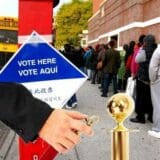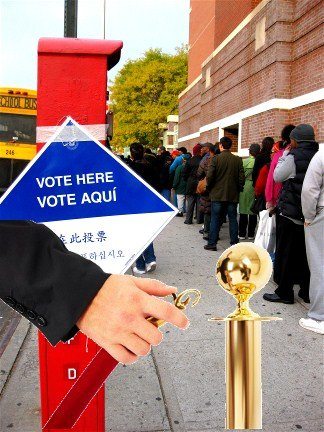

Former Los Angeles Mayor Richard Riordan is pushing a ballot initiative that would decimate city workers’ pensions and replace them with risky 401(k) plans.
Riordan is aiming more at voters’ emotions than he is at solving a budget issue. It won’t solve the city’s budget problems. If Riordan’s initiative gets on the ballot, it will only make things worse.
I’ve worked as a tree trimmer for the City of L.A. for 15 years. When thinking about Riordan’s plan, I want people in L.A. to ask themselves these questions: How is the pension I earn during my years with the city going to take food off your table or take money out of your pocket? How is my pension going to keep you from finding work or paying your rent and bills?
The answer is simple: My pension does not hurt your quality of life.
So, what’s the motivation for Riordan’s attack on retirement?


These pages are filled with stories of bad corporate actors — companies that attempt to boost profits by cutting labor costs at the expense of safe and ethical work environments. It’s a pleasure, then, to report on a multinational company’s CEO who is trying to make a difference.
Karl-Johan Persson, the CEO of H&M, recently traveled to Bangladesh, a country from which the fashion giant sources tons of textiles, to meet with Prime Minister Sheik Hasina and ask that textile workers be paid a fair wage.
The visit was pure activism as H&M does not actually own any Bangladeshi factories, it simply sources from the country. The argument Persson used with the PM is strikingly similar to that used by U.S. living wage advocates: A higher wage will be good for the country, not just workers.
Corporate Social Responsibility Newswire reports on the strategy behind the visit:
In addition to working with suppliers to increase wages,
» Read more about: A Responsible Persson: H&M's Boss Argues for Wage Hikes »



A new Frying Pan News infographic reveals the money and groups behind Proposition 32. Slide cursor over pyramid for interactive links.
» Read more about: Pyramid Scheme: Proposition 32's Power Elite »


Two weeks out from the presidential election, you may not have the epic battle between L.A.’s Chinatown community and Walmart foremost in mind. But this high-stakes conflict is nothing if not riveting, with all the twists and turns of a modern-day Chandler novel.
If you haven’t been paying attention the last few months, here’s a quick cheat sheet: In February Frying Pan News broke the story that Walmart was planning to open its first-ever Los Angeles grocery store in historic Chinatown. The prospect of the world’s largest retailer setting up shop in a neighborhood famous for its homegrown stores and restaurants prompted residents, business owners and activists to seek a temporary ban on chain stores in the area. Just as the City Council was poised to pass the ban, Walmart mysteriously – some would say suspiciously, in the wake of the corporation’s stunning Mexican bribing scandal – secured building permits for its Chinatown location the night before the Council vote.
» Read more about: Walmart vs. Chinatown: The Suspense Builds »


 Big Food companies and their lobbying groups have lied to us many times. They convinced Congress to include tomato paste on pizzas as a vegetable. They say we need industrial, chemical-laden agriculture to feed the world. (Check out Anna Lappé’s new video Food MythBusters to learn that we don’t.) And Big Food has also spread the mythology that if the minimum wage is raised, food will become so expensive that none of us will be able to afford to eat out – or eat at all – again.
Big Food companies and their lobbying groups have lied to us many times. They convinced Congress to include tomato paste on pizzas as a vegetable. They say we need industrial, chemical-laden agriculture to feed the world. (Check out Anna Lappé’s new video Food MythBusters to learn that we don’t.) And Big Food has also spread the mythology that if the minimum wage is raised, food will become so expensive that none of us will be able to afford to eat out – or eat at all – again.
Yes, that’s a lie! On this Food Day 2012, our organizations are releasing a new report, A Dime a Day: The Impact of the Miller/Harkin Minimum Wage Proposal on the Price of Food. The proposed Fair Minimum Wage Act, introduced this year by Representative George Miller (D-CA) in the House and Senator Tom Harkin (D-IA) in the Senate would raise the federal minimum wage from $7.25 to $9.80 per hour over the next three years and the tipped minimum wage from $2.13 to 70 percent of the regular minimum wage.
» Read more about: What Can You Get for a Dime a Day? A Lot, Actually »


Fifteen people have died and several hundred have been infected in an outbreak of meningitis contracted from contaminated spinal steroid injections. The numbers are growing and so is awareness of the growth of a little known corner of the pharmaceutical industry, called compounding pharmacies, which is responsible for the tragedy. “We’re nowhere near the end of this problem,” Dr. William Schaffner, an infectious diseases expert at the Vanderbilt University Medical Center in Nashville, told CBS This Morning.
The compounding pharmacies originally were supposed to provide customized medication for individual patients but have morphed into bulk manufacturers outside of FDA’s regulatory reach.
At the heart of the tragedy is the compounders’ successful track record blocking FDA authority that could have averted the disaster. Their efforts are a textbook model of industry opposition to new rules that could save lives. Their arguments are the same that the Chamber of Commerce and industry are using today to block clean air,
» Read more about: Meningitis Outbreak: Unregulated Labs' Disgraceful Legacy »


I wrote this post for The Stansbury Forum, a site honoring the work and spirit of union activist, writer, friend and mentor Jeff Stansbury, who died in 2008.
Five years in Los Angeles and I was still suffering from the region’s alienating social atmosphere. I had a few good friends, a new relationship and some interesting work under my belt in sales, journalism and PR. But I couldn’t shake the sensation that people in L.A. keep their distance and that there was something innately “asocial” about this place.
As I’ve explained, the labor movement was the tonic for my personal crisis. Southern California’s sprawl, materialism and hyper-individualism became less of a preoccupation when I started working with unions. I was finally giving up my fantasy of heading back to Vermont and could concentrate my mind on universal themes: big stuff like ethnic and class roots,
» Read more about: Making History: Remembering Jeff Stansbury »


 During much of this, my second year of retirement, I have been reading the three volumes of Taylor Branch’s history of America during the years of Martin Luther King, Jr. and the struggle for civil rights. Those rights hinged on the capacity of African Americans to vote, which state governments across the Deep South, especially, had precluded through a combination of laws and social conventions, reinforced by white-on-black violence. Here is the author’s first paragraph of the preface to his concluding volume in the trilogy:
During much of this, my second year of retirement, I have been reading the three volumes of Taylor Branch’s history of America during the years of Martin Luther King, Jr. and the struggle for civil rights. Those rights hinged on the capacity of African Americans to vote, which state governments across the Deep South, especially, had precluded through a combination of laws and social conventions, reinforced by white-on-black violence. Here is the author’s first paragraph of the preface to his concluding volume in the trilogy:
“Nonviolence is an orphan among democratic ideas. It has nearly vanished from public discourse even though the most basic element of free government – the vote – has no other meaning. Every ballot is a piece of nonviolence, signifying hard-won consent to raise politics above firepower and bloody conquest. Such compacts work more or less securely in different lands. Nations gain strength from vote-based institutions in commerce and civil society,
» Read more about: A Vote of Confidence: Why We Must Safeguard the Ballot »


 If you skipped down below, you saw that Joann is the Executive Director of the Food Chain Workers Alliance, a national coalition of workers’ organizations, and Jill is Director of Business and Culinary Development of Coosemans Shipping of L.A., a specialty produce distribution company. So, you may be wondering – what are these two doing writing a blog post together?
If you skipped down below, you saw that Joann is the Executive Director of the Food Chain Workers Alliance, a national coalition of workers’ organizations, and Jill is Director of Business and Culinary Development of Coosemans Shipping of L.A., a specialty produce distribution company. So, you may be wondering – what are these two doing writing a blog post together?
We are co-chairs of the Good Food Procurement working group of the Los Angeles Food Policy Council, an initiative of Mayor Antonio Villaraigosa. Over the past year and a half, our diverse group – including labor organizations, businesses, non-profit groups, school food service officials, public health advocates, and many more – has developed the Good Food Purchasing Pledge. And the L.A. City Council is poised to adopt the pledge via the Good Food Purchasing and Procurement Motion, sponsored by Councilmember Paul Koretz,
» Read more about: L.A. Is Leading the Good Food Movement! »